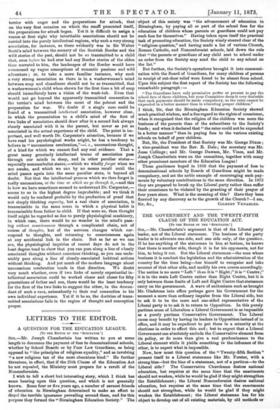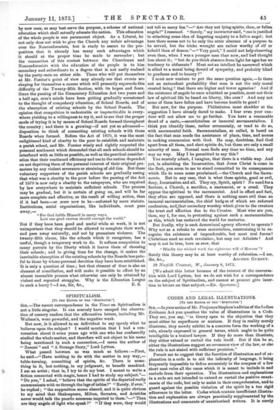THE GOVERNMENT AND THE TWENTY-FIFTH CLAUSE OF THE EDUCATION ACT.
[To THE EDITOR OF THE "SPECTATOR"] SIR,—Mr. Chamberlain's argument is that of the Liberal party leader, not of the Liberal statesman. The business of the party leader is to advocate one side, and one side only, of the question. If he has anything of the statesman in him at bottom, he knows that there is another side, though it is for his opponents, not for him, to bring it out. But the Liberal statesman—the man whose business it is conduct the legislation and the administration of the country for the time being hashimself to recognise and take account of that other side, and modify his own course accordingly. The nation is no more "Left" than it is " Right ;" it is " Centre;" it is in the main Left Centre rather than Right Centre, but it is only between these limits of Left and Right Centre that statesmen carry on the government. A wave of enthusiasm such as brought Mr. Gladstone into office perhaps gave his Government for the moment a more than ordinary impulse from the Liberal side, but to ask it to be the mere and one-aided representative of the Liberal party is to ask it to return to Opposition. In this purely partisan sense of Liberalism a Liberal Government is as impossible as a purely partisan Conservative Government. The Liberal cause may benefit by having its leaders in Opposition instead of in office, and it may be expedient to put them in a minority at the elections in order to effect this end ; but to expect that a Liberal Government can absolutely exclude the Conservative element from its policy, or do more than give a real predominance to the Liberal element while it yields something to the influence of the other, is to expect what is impossible.
Now, how must this question of the "Twenty-fifth Section" present itself to a Liberal statesman like Mr. Forster, with a strong bias—but the bias of a statesman, not of a partizan—to the Liberal side ? The Conservative Churchman desires national education, but requires at the same time that the enactments should not weaken, while he would be glad if they might strengthen the Establishment ; the Liberal Nonconformist desires national education, but requires at the same time that the enactments should not strengthen, while he would be glad if they might weaken the Establishment ; the Liberal statesman has for his object to develop out of all existing materials, by old methods or
by new ones, as may beat serve the purpose, a scheme of national education which shall actually educate the nation. This education of the whole people is one paramount object. As a Liberal, he mot only does not wish to give the Church any unfair advantage over the Nonconformists, but is ready to assent to the pro- -position that it already has many such advantages which it should at the proper time be made to surrender ; but the connection of this contest between the Churchmen and Nonconformists with the education of the people is to him secondary and subordinate to a degree that is not easily realised by the party-men on either side. Those who will put themselves at Mr. Forster's point of view may already see that events are shaping for themselves a course which will presently supersede this difficulty of the Twenty-fifth Section, with its hopes and fears. Since the passing of the Elementary Education Act two years and a half ago, men's minds have been getting gradually accustomed to the thought of compulsory education, of School Boards, and of the absorption of existing schools by the School Boards. The opinion that compulsion is undesirable or impracticable is every- where yielding to a willingness to try it, and to see that the proper anode of trying it is by means of School Boards formed throughout the country ; and there is a growing—if not yet so advanced- -disposition to think of connecting existing schools with those Boards when formed. Before the Act of 1870, it was the most -enlightened kind of charity to the poor to establish and maintain a parish school, and Mr. Forster wisely and rightly respected the personal sentiment which demanded that all such schools should be interfered with as little as possible, as well as the practical consider- ation that their continued efficiency and use to the nation depended on not depriving them of the personal interest of their original pro- moters by any violent severance or straining of old ties. But these voluntary supporters of the parish schools are gradually seeing that what was a charity to the poor before the passing of the Act of 1870 is now only a charity to the ratepayers, who are required by law everywhere to maintain sufficient schools. The process may be gradual, but it is certain of going on, and will be far more complete and effective, as the result of willing action, than if it had been—or were now to be—enforced by mere statute. Institutions, social organisations, like individuals, must pass away,—
"For God fulfils Himself in many ways, Lest one good custom should corrupt the world."
But if they have been good and useful while at work, it is not unimportant that they should be allowed to complete their work, and pass away naturally, and not by premature violence. The twenty-fifth clause, like the schools which it recognises, has a useful, though a temporary work to do. It softens compulsion to many parents by the liberty which it leaves them of choosing their schools ; and in giving time for the change, it makes the inevitable absorption of the existing schools by the Boards less pain- ful to those by whose personal devotion they have been established. It is only a question of time ; but that element of time is also an element of conciliation, and will make it possible to effect by an almost insensible process what otherwise can only be attained by violent and repeated struggles. Why is the Education League in such a hurry ?—I am, Sir, &c., E. S.



































 Previous page
Previous page